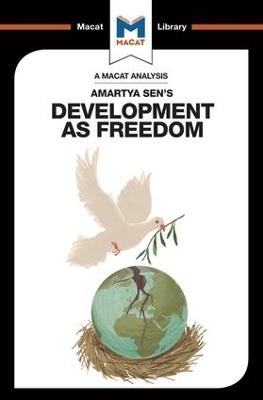
An Analysis of Amartya Sen's Development as Freedom
Macat International Limited (Verlag)
978-1-912127-04-7 (ISBN)
Amartya Sen uses his 1999 work Development as Freedom to evaluate the processes and outcomes of economic development.
Having come to the conclusion that development is best summed up as the expansion of freedom, Sen examines traditional definitions and understandings of the term. He says people tend to think of freedoms as economic (the freedom to enter into market exchanges) or political (the freedom to vote and be an active citizen), and tries to understand why the definition has been so narrow hitherto. He concludes that an evaluation of true freedom must necessarily include the freedom to access social services such as healthcare, sanitation and nutrition, just as much as it must acknowledge economic and political freedoms.
Evaluating the relevance of the current thinking behind development, Sen concludes that the term ‘freedom’ cannot simply be about income. In many ways, measuring income does not account for various “unfreedoms” (manmade or natural bars to wellbeing) that hinder development. Sen’s evaluation is all the more powerful for its clarity: "The freedom-centered perspective has a generic similarity to the common concern with "quality of life."
Janna Miletzki is researching for a PhD in human geography at LSE. Nick Broten was educated at the California Institute of Technology and the London School of Economics.
Ways in to the Text Who is Amartya Sen? What does Development as Freedom say? Why does Development as Freedom matter? Section 1: Influences Module 1: The Author and the Historical Context Module 2: Academic Context Module 3: The Problem Module 4: The Author's Contribution Section 2: Ideas Module 5: Main Ideas Module 6: Secondary Ideas Module 7: Achievement Module 8: Place in the Author's Work Section 3: Impact Module 9: The First Responses Module 10: The Evolving Debate Module 11: Impact and Influence Today Module 12: Where Next? Glossary of Terms People Mentioned in the Text Works Cited
| Erscheinungsdatum | 10.07.2017 |
|---|---|
| Reihe/Serie | The Macat Library |
| Verlagsort | London |
| Sprache | englisch |
| Maße | 129 x 198 mm |
| Gewicht | 130 g |
| Themenwelt | Geisteswissenschaften ► Psychologie ► Allgemeine Psychologie |
| Naturwissenschaften ► Geowissenschaften ► Geografie / Kartografie | |
| Sozialwissenschaften ► Pädagogik | |
| Wirtschaft ► Volkswirtschaftslehre | |
| ISBN-10 | 1-912127-04-0 / 1912127040 |
| ISBN-13 | 978-1-912127-04-7 / 9781912127047 |
| Zustand | Neuware |
| Haben Sie eine Frage zum Produkt? |
aus dem Bereich


